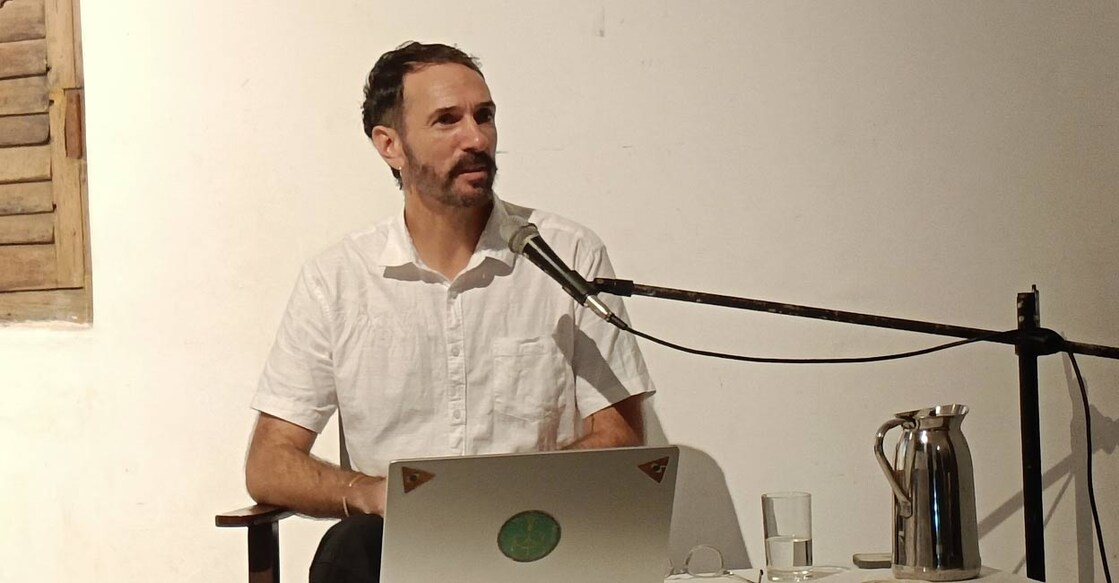US musician Grey Filastine’s Arka Kinari to dock in Kochi in 2025, spreading climate change awareness

Mail This Article
Kochi: The Arka Kinari – a 70-tonne boat that has become the symbol of an artist couple’s convictions about their life and art – will touch the shores of Kochi next year. Since the vessel started its voyage with US-based musician Grey Filastine and his wife and co-performer Nova Ruth from Indonesia onboard, it has covered 25 nations, spreading awareness on climate change without guilt.
The unique sailing story was shared by Filastine to a small gathering at Durbar Hall in Kochi on Wednesday. Filastine, who has been a touring artist for over 25 years, was in Kochi to do the necessary research and find allies ahead of the performance scheduled on the shores of Kochi next year.
The Arka Kinari, named after the Latin word for vessel, and mythological Kinnara, a half-human-half-bird musician, has become the couple’s home, as well as the performance venue.
“We don’t have a place to go back. We sold our home to buy the ship,” Filastine, said in response to a question from the audience on how the funds for the unique trip was raised. He was interacting with the audience after the screening of his live documentary narrating the tale of The Arka Kinari. Filastine narrated the story live corresponding to the film with an intriguing background score.
The Arka Kinari carries onboard a crew numbering around seven who double as sound and lighting engineers along with looking after duties such as welding, carpentry and cooking. Filastine, who had no knowledge of sailing before he took off the courageous journey, has evolved to be the captain over the years in the sea.
“Arka Kinari is a ship, a voyage and a performance atop that ship. It's also an experiment in living, an experiment in making art, an experiment in bringing people together in a world that's falling apart,” he told Onmanorama after the screening performance.
Once in a port, the ship becomes the stage while the audience finds a place on the dock.
“We do cultural archiving, we do workshops on sustainability in the see, and we do community outreach and education around ecology,” he said. The couple bought the vessel, which has a history dating back to the Nazi-Germany, from a dock in Rotterdam, Netherlands and made it sea-worthy.
The voyage started in Europe and the schooner is now in Indonesia, which the couple call their home waters. The voyage has covered Netherlands, France, Portugal, Morocco, Spain, Cabo Verde, Panama, Mexico, Hawaii, Guam, Indonesia, Australia and Philippines.
Asked what triggered the idea of the voyage, Filastine said: “It's because touring, talking about climate change and the sixth mass extinction of nature while flying from event to event was very hypocritical. And, I wanted to find a better way of operating something consistent with my values.
The values he mentioned have an uncompromising idea of humanity that transcends boundaries. “I don't really focus on countries because countries are made by political borders, which is something that I'm quite against. So it’s more like connections and routes and territories and spaces.”
On the planned tour to India, he said the country is important because “it's part of an ancient and historic oscillating trade route based upon the trade winds, which flip.”
“About half the year you have wind from the west, another half of the year you have from the east.
This allowed trade across this part of the world for 5,000, 10,000 years. So we're following in those honoured paths that have been developed over thousands of years. So that's not about this country or that country. It's about the networks. This sailing network has connected people from the Arab, from the Mediterranean to the Arab countries, to South India, to Indonesia and Spice Islands for thousands of years,” he said.
India is not new to Filastine. The land has been part of his musical journey as he learned percussion from Kolkata, Varanasi and Rajasthan.
Though it started with a struggle, the art tour has been receiving enough funding for the last three years. “In Australia, we functioned commercially, so festivals bought the performance and covered all of our costs. Whereas in Indonesia, we run an NGO that funds all of our work. Because everything we do is free, it's always free in the port,” he said.

